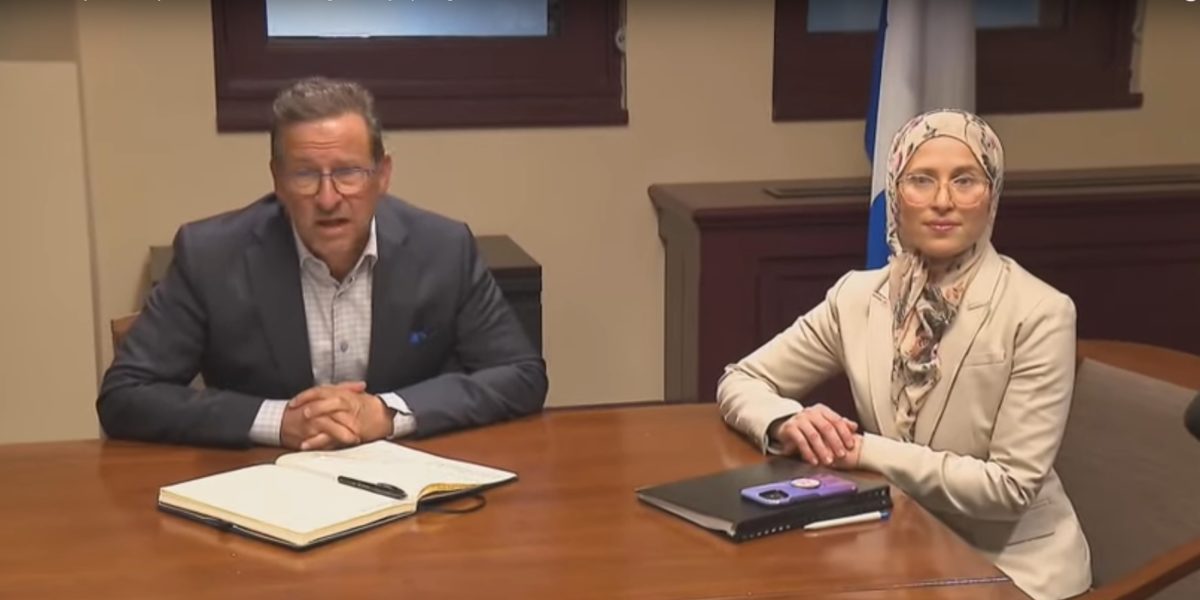Canada, it is often said, is a country of two soliloquies. But there is another divide shaped by race and religion that results in its own monologues. One of these is the one where whiteness transcends traditional left-wing and right-wing perspectives and combines these political positions into a commentary on what anti-Muslim racism should be about, and who should lead an effort to tackle it.
We saw this monologue dominate in early February in a theatre over the federal government’s appointment of a Special Representative on Combatting Islamophobia, Amira Elghawaby.
People were affronted about an op-ed she had written (with a white, Jewish man, Bernie Farber) that showed that 88 per cent of Quebecers who dislike Islam support Bill 21.
Suddenly the conversation was not about why the new position was created, or why anti-Muslim hatred is rising in Canada, or what to do about it.
Like ships that pass in the night, Elghawaby’s appointment was deluged by how Quebecers, left-leaning and right-leaning, the majority of whom are white (87 per cent), felt about being called anti-Muslim.
This monologue is called “white fragility,” discovered by Robin DiAngelo, a white educator at the University of Washington. DiAngelo learned in 20 years of diversity training that white people often react with anger and disbelief when racism is discussed. She concluded that whites equate racists with bad people. They do not think of themselves as bad, so they conclude they cannot be racist. The mere hint suggesting they did something racist leads to anger and denial.
READ MORE: Amira Elghawaby’s detractors resort to dubious arguments
Doesn’t this sound similar to the storm of reactions against Elghawaby? She was accused of not understanding Quebec secularism thoroughly. Quebec politicians from across the left-right spectrum have said this is one of the reasons they call for Elghawaby’s resignation.
All of this misses the point, which is not Quebec’s version of secularism. It is how Muslims experience living in Quebec. Those Quebecers, those who are Muslim, who do understand Quebec secularism, they still experience anti-Muslim racism, in spite of having this knowledge.
The Special Representative is there to listen to their stories, not those of white Quebecers who do not experience racism, or anti-Muslim racism.
Individual Quebecers are not all racist, but as a collective they have embraced a piece of legislation that discriminates against non-Christians. Bill 21 prohibits Muslims, Jews and Sikhs from wearing religious clothing in a wide range of public positions. Bill 21 only makes sense in a Christio-secular heritage that does not require headgear as part of religious expression.
The Association for Canadian Studies listened to the voices of over 600 Quebec Muslims, 100 Jews and 50 Sikhs to learn about their responses to Bill 21. The results were released in August 2022. They found an overwhelming number of Muslim women say they do not feel accepted as part of Quebec society. The women recounted stories of being spat on or chased by trucks; one was called a “dirty immigrant” by police.
In the same month of August 2022, Global News carried the story of an eight-year-old girl who had witnessed her parents being berated and racially insulted in her driveway. After this traumatizing event, she was scared to leave her house.
Montreal is amongst the big cities of Canada where police reported hate crimes rose in 2020.
How is it “anti-Quebec” to quote from a poll conducted in Quebec that tabulates responses from Quebecers? No amount of squirming can avoid the facts.
The conversation has focused on the wrong issues. Instead of gleaning insight into the ugly side of Canada, the one that non-whites regularly experience, the dialogue has been about the feelings of the majority white society of Quebec.
If people want an inclusive, tolerant Canada, we need to shine light on the dark places in order collectively to find remedies.
That’s what the Office of the Special Representative to Combat Islamophobia is for. It is not about the feelings of non-Muslim Quebecers. It is about the daily micro-aggressions, hate incidents and hate crimes that Muslims face.



